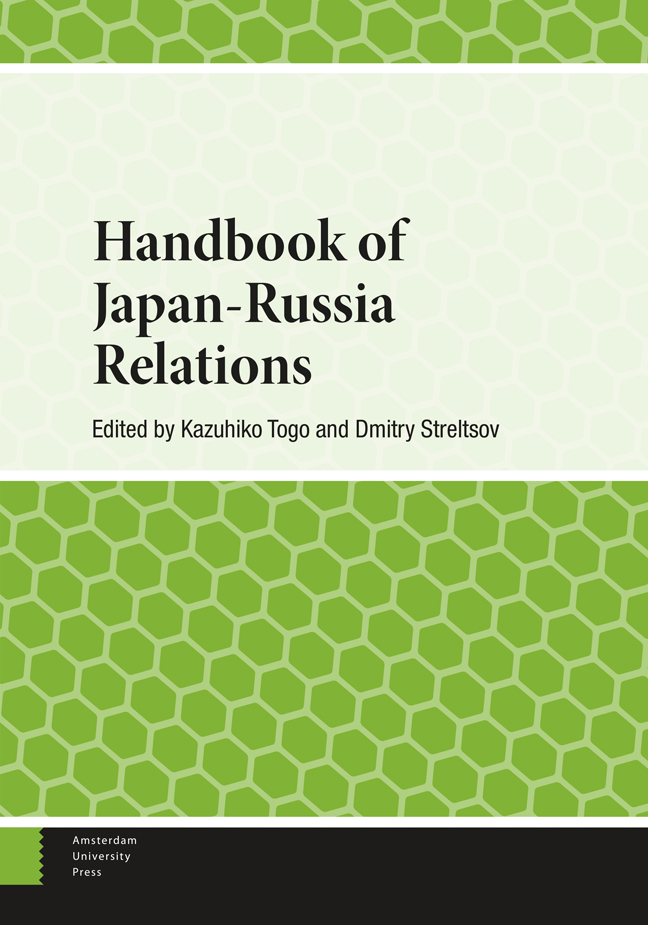Book contents
- Frontmatter
- Contents
- Dedication
- Acknowledgements
- Contributors
- Abbreviations
- Introduction
- Part 1 War and Peace: Diplomatic Relations and Security
- Part 2 Territory
- Part 3 The Economy and Energy
- Part 4 Disaster Cooperation
- Part 5 Culture
- Part 6 Perceptions of the Other
- Appendix 1 1956 Joint Declaration
- Appendix 2 Tokyo Declaration (1993)
- Appendix 3 Moscow Declaration (1998)
- Appendix 4 Irkutsk Statement (2001)
- Appendix 5 Foreign Ministry Statement (2022)
- Index
17 - The Troublemaker? Russian Perceptions of the Role of the United States in Russia-Japan Relations
Published online by Cambridge University Press: 26 March 2024
- Frontmatter
- Contents
- Dedication
- Acknowledgements
- Contributors
- Abbreviations
- Introduction
- Part 1 War and Peace: Diplomatic Relations and Security
- Part 2 Territory
- Part 3 The Economy and Energy
- Part 4 Disaster Cooperation
- Part 5 Culture
- Part 6 Perceptions of the Other
- Appendix 1 1956 Joint Declaration
- Appendix 2 Tokyo Declaration (1993)
- Appendix 3 Moscow Declaration (1998)
- Appendix 4 Irkutsk Statement (2001)
- Appendix 5 Foreign Ministry Statement (2022)
- Index
Summary
This chapter explores the widespread Russian perception that the United States is the principal cause of friction between Japan and Russia. It recognizes that the US-Japan alliance was formed as a bulwark against the spread of communism, and, during the Cold War, the Soviet Union was the principal adversary against which the alliance was directed. However, in more recent times, the predominant focus of the US-Japan alliance has shifted from Russia to China and North Korea. Furthermore, while the United States did play a role in fomenting the Russo-Japanese territorial dispute, Russian claims that Washington prevented its resolution during the 1950s via the so-called “Dulles Intervention” are without foundation. Overall, while Washington has, at times, strived to prevent rapprochement between Japan and Russia, it is equally true that Moscow has endeavored to drive a wedge between Japan and the United States.
Introduction
Russia and Japan famously lack a peace treaty to conclusively end the Second World War. Also, even before Russia’s full-scale invasion of Ukraine, bilateral trade was well below its potential, totaling just $16.5 billion in 2020. Added to this, Japanese citizens routinely express negative attitudes towards their northern neighbor. For instance, according to an opinion poll conducted by Japan’s Cabinet Office in October to December 2020, only 13.6 percent of Japanese expressed a positive attitude towards Russia. By contrast, the percentage voicing positive sentiments towards the United States was 84 percent.
What accounts for the relatively cold nature of relations between these two powerful neighbors? The most obvious answer is the territorial dispute over the Russian-held Southern Kurils, which Japan claims as its Northern Territories. These islands off the northeast coast of Hokkaidō were acknowledged by both parties as being Japanese territory in 1855, yet were seized by Soviet forces at the end of the Second World War and have remained under Moscow’s control ever since.
However, while the territorial dispute is the most visible manifestation of friction between Japan and Russia, it can be argued that it is actually a symptom, rather than a cause. There is an alternative argument, which has many adherents on the Russian side, that it is not the islands issue, but rather Japan’s relationship with the United States, which is the principal obstacle to closer bilateral ties.
- Type
- Chapter
- Information
- Handbook of Japan-Russia Relations , pp. 308 - 329Publisher: Amsterdam University PressPrint publication year: 2024

